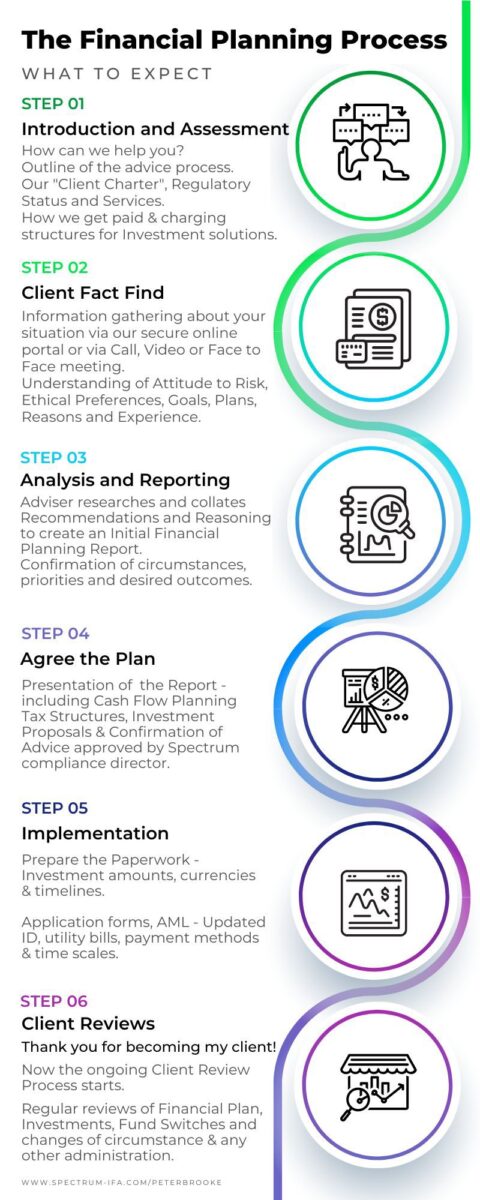I have started 2023 with a new mission – to get myself, my clients and my future clients even more financially organised. We have some cool tech, a new booking system, an online secure portal for financial modelling and a new communications plan.
What’s Your Plan for 2023?
By Peter Brooke
This article is published on: 3rd March 2023

My aim is to help you to become more financially confident throughout 2023 and beyond. I will endeavour to make everything as clear, concise and as interesting as possible – we are in this together!
What is Financial Planning?
Everyone will need some form of financial plan at some point in their lives – but WHY do you need it? And HOW do you do it?
WHY do you need a financial plan?
“people don’t plan to fail, but often fail to plan”
Budgeting for living costs, building up savings, planning for retirement or education, saving for future large expenses, buying property, protecting your family, leaving something for future generations… all of these are considered in a financial plan.
Then do all of this in a new country with a different language, different tax system and different rules and regulations and we can see that having a well thought-out plan in a language you fully understand could be worth its weight in gold!
In addition, for Brits living in Europe there are the added complexities of Brexit since you will now lose access to UK based advice and financial products.

HOW do you create a financial plan?
Fundamentally there are two easy questions to answer which give us the skeleton of the financial plan:
1. What do you earn, spend, owe and own? This is an audit of where you are today, financially.
2. What do you want? This is a list of your hopes and aspirations, let’s call them goals, for the future.
Common ‘goals’ include:
- Can we retire early?
- How much do we need to have to retire?
- Can we pay for our kids private or university education?
- Can we buy that house we want?
- Can we take that trip?
- Can we leave money for the family?
Combining these considerations allows us to create a ‘road map’ for the coming months, years and decades and helps you understand what compromises you might need to make today to achieve the things you want for the future.
You can then feel more confident that you are on the right path to future happiness and security totally aligned to your own personal hopes and aspirations.
HOW do I help you create your financial plan?
Here is a summary of the Spectrum process and how I, as your professional adviser, can help you through the journey of establishing a plan.


Your Spectrum Adviser – Peter Brooke
I have been in the personal finance industry since 1999 and based in France helping people like you since 2004.
I am a proud family man and love living in France; our two children, both now teenagers, were born in France and will soon be completing their schooling and will be off to university before we know it!
I am a partner and senior adviser in Europe’s largest expatriate financial advisory group; Spectrum have more than 50 advisers across Western Europe and due to our size have terms of business with some of the largest and strongest insurance and investment providers in the world; though we are independent of them.
I have a strong background in investment management and as such sit on the Spectrum Investment Management Committee which provides resources to all of our advisers, and their clients, across Europe.
I have a healthy passion for ethical & sustainable investing as a vital area of focus for the future of investing, our planet and society.
Should I make a tax return? If so, why?
By Peter Brooke
This article is published on: 16th June 2018

By Peter Brooke & Patrick Maflin of Marine Accounts
Understanding tax liability is still a big issue for yacht crew; in fact, the confusion mainly comes from the lack of clarity about being “Resident” or “Non-Resident” somewhere. Many crew members are still putting their heads in the sand and ignoring this issue; in our humble opinion this needs a cross-industry culture change, as the repercussions for continuing to ignore tax are becoming more onerous and punitive.
So why should I bother declaring my income?
• You will avoid massive penalties, fees and interest on the taxes that you ‘might’ owe should you be investigated later.
• Your info is out there: The Automatic Exchange of Information means that all your financial information is already being shared between governments.
• Common Reporting Standards: All financial institutions such as banks, insurance companies, and investment firms are required, by law, to attain, keep and share residency information for all account holders.
• I want a mortgage: Most lenders now require proof of earnings in the form of tax returns.
• I live on a yacht and so am not resident anywhere! Does your home authority agree with your assessment of your situation? Get it in writing!
On this last point, it is a huge misconception that just because you believe that you aren’t resident somewhere, the tax authorities will not be interested in you. The onus is firmly on the individual to prove non-residency, not on the authorities to prove residency. If you can’t present a convincing case, it is highly likely that the tax authority with which you have that link will deem you to be a resident. If you haven’t declared your income to them voluntarily, they will look less favourably at your situation and can apply significant fines and interest.
So where should I declare?
If in doubt look at it in this order:
1. Time spent – if you spend time ashore where are you spending it? Keep a diary/spreadsheet of EVERY day.
2. Assets – where is most of your wealth kept?
3. Family – do you have major links to a certain country (especially important if you have children)?
4. Nationality – if you are not resident in a country due to time spent, assets or family links it is likely you should be declaring your income to your ‘home’ authority – i.e. where you are from originally.
Don’t wait to be called upon by any ‘linked jurisdictions’, be proactive, understand the tax residency rules of all of these ‘linked jurisdictions’ and voluntarily declare to the most strongly linked one. It will help you sleep at night and could save thousands in fees and interest, as well as avoid black marks on your record.
This article is for information only and should not be considered as advice. Marine Accounts assist crew with tax residency in many jurisdictions.
Peter Brooke is a financial adviser to the yachting community with the Spectrum IFA Group. Spectrum has created HORIZONS, a unique financial solution just for yachts and their crew at
www.my-Horizons.com or contact@my-horizons.com or peter.brooke@spectrum-ifa.com
Is lending money to a government still low risk?
By Peter Brooke
This article is published on: 26th July 2017

If you buy a government bond, sometimes called GILTS (UK), BUNDS (Germany) or T-Bills (US), as an investment, then you are effectively lending that government money. Most portfolio managers say investors should have some bond exposure in their investment portfolios as they diversify away from other assets like shares.
How do Bonds work?
You start by buying a bond on ‘issue’ for a set issue price with a ‘promise’ to pay you back the same amount in a date in the future. In the meantime, the bond pays you a ‘coupon’ or interest in payment for you lending your money. The bonds are also traded on a ‘secondary bond market’ where the price fluctuates according to supply and demand but the coupon remains the same… this means that your interest rate changes depending on what price you pay for the bond.
You can also invest in ‘funds’ of government bonds which are managed by professional managers using new issue and secondary market bonds around the world to build a diversified portfolio… but are they as low risk as they are made out to be?
Traditionally these forms of investment have always been viewed as low risk, as governments, unlike companies or individuals can always ‘print money’ and so can always pay you back. This also means that the interest rate you receive (the coupon) will be lower than company bonds.
If we consider that RISK is the chance of loss then I would argue that these investments are no longer low risk. Right now, we are in an environment where interest rates are at all-time lows around the world, inflation is starting to bite and so the chance of an interest rate increase by central banks is high; even though the rate increases may be low.
If you are holding any bond and interest rates go up, then bond values will drop, therefore I would argue that at some point you are risking a capital loss by holding government bonds. Some analysts believe that a 1% increase in interest rates could lead to a 10% capital loss on most bonds. If this is the case are you now being compensated for this risk of loss? Well, no… interest rates on government bonds are around 1% now and so with inflation higher than 1% in most countries you are losing money on an annual basis too.
So, what can you do about it? The first option is to take a little more risk and swap your government bonds for high quality corporate bonds… the coupon will be greater and as long as the companies are in good health then they should be able to repay you at the end of the term… there are also funds of corporate bonds which diversify risk.
The corporate bond market is segmented by credit rating so be aware of the level of risk this can bring to your savings… “high yield” (Europe) or “junk bonds” (US) tend to behave more like shares.
Another option would be to diversify away from western government bonds into emerging market government bond funds… there is some extra currency risk, though this can help performance too. Finally, you can outsource the choice of the bonds you buy by using a Strategic Bond fund… this will invest in corporate, government and emerging markets bonds on a strategic basis and would be very diversified.
This article is for information only and should not be considered as advice.
Should you consider transferring your Final Salary Pension Scheme?
By Peter Brooke
This article is published on: 10th October 2016

There have been a number of recent changes within the UK economy and UK pension rules that make a review of any pension(s) essential for those living or planning to live outside the UK. Final Salary pension schemes (also referred to as Defined Benefit schemes) have long been viewed as a gold plated route to a comfortable retirement, however there are likely to be large changes ahead in the pension industry. The key question is; will these schemes really be able to provide the promised benefits over the next 20+ years?
Why Review now?
Record high transfer values
– Gilt rates are at an all time low. This has caused transfer values to be at an all time high, some transfer values have increased by over 30% in the last 12 months.
Scheme Deficits
– Actuaries Hyman Robertson now calculate the total deficits on remaining final salary pension schemes as £1 Trillion!
TATA Steel/BHS
– Recent examples show that these very large deficits cause a number of problems, in particular no one wants to purchase these struggling companies as the pension deficits are too big a burden to take on.
– Could the Government be forced to change the laws to allow schemes to reduce benefits? A reduction in the benefits will reduce the deficits and make the companies more attractive to purchasers. There is a strong argument that saving thousands of jobs is in the national interest, if that just means trimming down some of these “gold plated benefits”.
Pension Protection Fund (PPF)
– This fund has been set up to help pension schemes that do get into financial trouble, two points are key. Firstly it is not guaranteed by the Government and secondly the remaining final salary schemes have to pay large premiums (a levy) to the PPF in order to fund the liabilities of insolvent schemes. As more schemes fall into the PPF there are fewer remaining schemes that have to share the burden of this cost. Their premium costs will increase as there will be fewer remaining schemes to fund the PPF levy.
– It is likely the PPF will end up with the same problems as the final salary schemes, they won’t have the money to pay the “promises” for the pensioners. Additionally the PPF will most likely have to reduce the benefits they pay out.
Pension changes that have already happened
Inflationary increases have already been permitted to change from Retail Prices Index (RPI) to Consumer Prices Index (CPI), this change looks reasonably small, but over a lifetime this could
reduce the benefits by between 25% and 30%.
– In April 2015 unfunded Public Sector pension schemes have removed the ability to transfer out, so schemes for nurses, firemen, military personnel, civil service workers etc. can no longer transfer their pensions. Now these are blocked, it will be easier to make changes to reduce the benefits and no one is able to respond by transferring out.
– When this rule change was being discussed the authorities also wanted to block the transfer of funded non-public sector schemes, i.e. most corporate final salary schemes. There is therefore a risk that transfers from all final salary schemes could be blocked or gated.
Autumn Statement (Budget)
– This is on 23 November 2016. Could the Government make any further changes to Pension rules? When Public sector pensions were blocked there was a small window of time to transfer, however most people couldn’t get their transfer values in time as the demand was so high. People who review their pensions now may at least have time to consider options.
– Could Brexit end the ability to transfer pensions away from the UK? – this is still unknown, but Pensions are often a soft target of government taxation ‘raids’.
Reasons why schemes are in difficulty:
Ageing population – people now expect to live around 27 years in retirement, when these schemes commenced the average number of years in retirement was 13 years.
Lower Investment Returns – Investment returns have not been as high as expected, also there has been a very large reduction in equity (shares) content in final salary schemes, this is now around 33%, in 2006 the average equity content was 61.1%.
Benefits were too good – Simply, many of the final salary schemes were too good. In 2016, if you became a member of a 1/60th scheme then your company would need to add 50% of your salary to make sure the benefits can be paid. Clearly this is unrealistic.
What could happen in the Future?
– An end to the ability to transfer out of such schemes
– Increase the Pension Age, perhaps in line with the increase of the State Pension
– Reduction of Inflation increases, (already started as many now increase by CPI instead of RPI)
– Reduction of Spouse’s benefit
– Increase of contributions from current members
– Lower starting income
Can you work on yachts and still get a UK state pension?
By Peter Brooke
This article is published on: 30th June 2016

Even if you are (or have been) a UK tax resident and religiously file your Seafarers tax return every year (which you probably should), does it mean you benefit from such things as the UK State Pension? Unfortunately not…. in order to qualify for any UK state pension (currently approximately £155per week from around age 67,) you need to pay National Insurance contributions (NIC). You need at least 10 qualifying years to receive any of the ‘new state pension’ (for those born after 1951).
In order to be eligible to pay NIC and therefore build up some allowance for UK state pension you must have a NI Number.
There are 4 main classes of NIC
- Class 1 – paid by UK based employees earning more than £155 a week and under State Pension age
- Class 1A or 1B – paid by employers
- Class 2 paid by self-employed people
- Class 3 – voluntary contributions
- Class 4 – paid by self-employed with profits over £8,060p.a.
For yacht crew, who very rarely have any social security contributions in any country, due to the flag state not collecting them from employing companies or due to not having social security systems as we know them, it is highly likely that you will have gaps in your NI record. If you do have a gap it is possible to pay ‘voluntary’ contributions to top up your NI record and receive more pension income later.
We believe that crew should be paying the Mariners Class 2 NICs which are considerably cheaper than Class 3 and have the additional benefit of ‘contribution based employment and support allowance’ when they return to the UK, which is not available if you pay class 3 NICs.
Currently it costs £2.80 a week for Class 2 (£145.60p.a.) or £14.10 a week for Class 3 (£733.20p.a.); either way, the cost is very low to secure an income for life later.
To put this into perspective… if you were to theoretically only pay Class 3 for 35 years you would invest a total of £25 662; you then receive £155per week from, say, 67 which is £8060p.a. which equates to a yield on investment of 31% per year – a no brainer, assuming of course the UK government can continue to pay! *also it is unlikely you can only pay Class 3 for all 35 years, but the point is clear!
However, the form to apply for a review of the NI gap and to register to pay voluntary NICs is complicated and quite detailed which can put some people off from even applying to see if they are eligible to pay it. This is also another great reason to keep a seaman’s discharge book up to date at all times, right from the start of your career.
I would like to thank Clare Viner from Marine Accounts, who are experts in yacht crew taxation, for her assistance in researching this article.
There is also a wealth of information on the UK government website and a Mariners NI Questionnaire which can be filled out for a review of the situation
https://www.gov.uk/government/publications/mariners-national-insurance-questionnaire
This article is for information only and should not be considered as advice.
Planning for the yachting season ahead
By Peter Brooke
This article is published on: 22nd February 2016

You spend much of your professional lives working hard for other people; this season I want to challenge you to do one thing for you and your future every month.
MARCH (i.e. now):
Consolidate your bank accounts – you don’t need them all.Have an account in the currency in which you are paid and another in any other currency you regularly use. You don’t, need lots of accounts, but make sure your total balance is below the compensation limits for the jurisdiction in which you hold the account .
April:
Don’t spend money just moving it around, open a currency broker account. If you need to move money from one currency to another, don’t use your bank, your currency broker can save you a small fortune on exchange rates and fees.
MAY:
Invest in yourself! What are you going to do at the end of the season? Consider now what your next set of exams will be and when you can do them. Put money aside for fees and living costs. Check your visas and passports if you are crossing to the U.S. later in the year. And start a diary (see November…).
AUGUST:
This is the really busy time; stop and consider your longer term future. How long do you want to stay in yachting? What do you want to do after yachting?What do you want to get from yachting (personally and financially)?
SEPTEMBER:
The season is calming down – are you really covered? Time to check exactly what health insurance you have on board and if there is any accidental injury or even death in service protection for you and your beneficiaries while you work. When you know, tell someone at home so they can claim on your behalf if necessary.
OCTOBER:
Cash is no longer king. At the end of your season you may have a pot of cash that you can’t get into your bank (due to strict money laundering rules). Negotiate to have tips paid directly with your salary into your bank account, keeping only the petty cash required. Many Captains will do this.
NOVEMBER:
Tax residency is a matter of fact. Get organised and keep a diary of your travels. Yacht crew are “approached” by various tax authorities that believe you might be a resident. It’s not down to them to prove that you are a resident in their country, it’s down to you to prove you’re not. Understand the residency laws of the countries where you are most likely to become a resident, then keep a diary and flight ticket stubs, to support your case.
DECEMBER:
If you’ll be in the yachting industry for more than two or three years, seriously consider saving for your future, Your friends on land are paying tax and social security, which will give them something at retirement – are you? It’s up to all crew to put something aside (I suggest at least 25 percent of salary) while they’re in the industry to try and secure their financial wellbeing. The million dollar rule – to retire on an income of $/€3,OOO per month in 15 years, you will need approximately $/€1.1million in assets.
The trends for 2016 – The view from the Gondola.
By Peter Brooke
This article is published on: 27th January 2016

We have just returned from our annual Spectrum Conference, this year 30 advisers headed to the stunningly beautiful city of Venice.
With two days set aside for discussion and rumination over global markets and other financial changes and issues… in retrospect it seems incredibly well timed…. up to the day of departure for Venice, from the start of 2016, stock markets had fallen between 8 and 15% and Brent Crude Oil was down 20%.
So could we come back from this conference with a view on whether this highly volatile trend was to continue and was this really the end of the world? Well… yes we could.
We are very lucky to be part of a company large enough to access the resources from some of the biggest and best names in our business and they all presented fairly similar views on where we are and where we might be going, and they can all be summarised by looking at 3 main trends and a few smaller issues:
OIL, CHINA, INTEREST RATES and then EMPLOYMENT and BREXIT… so with enormous thanks to companies like Blackrock, Henderson Global Investors, Jupiter, Kames Capital, Rathbones and Tilney Bestinvest, let’s try and look at how these might affect us all.
- If you believe that there is a global recession around the corner… then sell everything and stay in cash! – We don’t!
- Is this like 2008? NO, but we could talk ourselves into it! The Global Macro scene is not that
- Markets will now move to looking at “growth” rather than being “policy” led like from 2009 to 2015. (eg QE etc)
- GDP growth is at its strongest since 2010.
- Divergence is increasing around the world (ie. end of QE in US, but increase of QE in Europe).
THE MAIN ISSUES:
CHINA – the bulk of the slowdown is now behind us, in fact China have been doing exactly what we, as the developed world, have been asking them to do for the last few years… i.e. devaluing their currency and switching to a new ‘consumption based economy’ – this all makes good economic sense BUT their communication has been poor and the ‘fiddling’ in their stock markets has not been appreciated. The economic growth rate is stabilising and as the ‘new’ tech lead, consumer economy becomes greater therefore slowdown in the ‘old’ commodity heavy manufacturing economy will matter less to the overall rate. 4 – 6% GDP growth per year is realistic for the foreseeable future… it’s still a very good growth rate, especially for the biggest economy in the world.
When China was growing at 12%, it was 1/5th size it is now… the relative amount of GDP in real terms is significantly greater now than it was then… the headline rate, might be just that… a headline in a newspaper but the over-reaction to the inevitable slowdown has been pronounced.
OIL – massive sell off through 2015… Not due to drop in demand but due to oversupply… “The Saudis are telling the US to ‘frack’ off, they want to put the US Shale gas business out of business”
BUT – the break-even cost of extraction has dropped from $110 per barrel in 2011 to $34 per barrel now, so the US can afford lower prices for longer. Some countries must keep production high just to maintain some revenues; they can’t afford to stop, even at these low prices. … This is becoming a ‘who blinks first’ situation and is all about power and geopolitics rather than normal market influences.
Low oil prices can help consumption-lead economies (New china, US, Europe etc).
INTEREST RATES – Not this year’s problem as rate changes don’t affect the economy for 12 to 24 months. The market is pricing in for at least two more US rate rises…. there is now less consensus opinion on whether this is now correct. Policy on rates is diverging across the world, US and UK increase, EU stable but with lots of QE and EM likely to decrease.
The best environment for equity market growth is when rates are rising AND growth is rising BUT rising interest rates can mean more stock market volatility as well.
Other Issues;
EMPLOYMENT – conditions are right for wage growth, especially in the US, where unemployment has fallen faster than expected. If wage growth comes through then individuals tend to spend rather than save (unlike companies) and this can lead to price inflation and further growth.
BREXIT – don’t believe the hype… if UK votes to leave the EU then there will still be 2 years of protracted negotiations as to how they leave. There are major concerns for the Finance Industry which is one of the UK’s biggest industries and cross border regulation AFTER leaving the EU could have very deep effects.
Likely to be a SOFT BREXIT or a HARD BREXIT, both lead to different scenarios playing out. Likely to be greater volatility in UK markets and GBP in the run up to the referendum but no specific trend either way.
OVERALL STRATEGY – CONCENSUS from the experts:
- Still preference for allocation to EQUITIES
- Probably add in more ALTERNATIVE INVESTMENTS or ABSOLUTE RETURN STRATEGIES over more in bonds.
- EMERGING MARKETS not ready – JUST YET!!!
- GOLD could be a good small hedge
- USD to remain strong
So overall, as a member of the Spectrum Fund committee, an investor myself and an adviser to my clients, I feel that the world isn’t over and it isn’t 2008 again. There are good shoots of growth in many markets and even with the “slow down” in China they are still the major engine for growth across the world. Many companies (and this is after all what we are interested in as investors) are healthy still (especially in Europe) and look to be reasonable value.
2016 is going to be volatile but we will make it through and there could be some surprises along the way. Since we arrived in Venice, until today, Oil is up 7% and most markets are up between 1% and 4%!!
Offshore Disclosures Facility
By Peter Brooke
This article is published on: 25th May 2015

This month I had the opportunity to sit down with Patrick Maflin from Marine Accounts for a Q&A session on the Offshore Disclosures Facility.
Patrick, Firstly what is the Offshore Disclosures Facility?
The Offshore Disclosures facility is an amnesty for UK citizens who have undeclared offshore earnings. It is directly aimed at targeting offshore tax evasion. The G20 have now opted similar schemes such as the Offshore Disclosures Program (ODP) in the US & Project Let’s Do It in Australia.
What is offshore evasion?
Offshore evasion is using another jurisdiction’s systems with the objective of evading UK tax. This includes moving, not declaring or hiding (via complex offshore structures) any income, gains or assets out of the site of HMRC.
When does the amnesty end & what happens if I do not declare?
The UK disclosure facility ends on 30th September 2016. Individuals who choose not to declare their earnings can face fines of up to 200% of the tax evaded and possible imprisonment as it is now a criminal offence. Project Let’s Do It in Australia came to an end in December 2014 and the IRS have not stated when ODP will end.
How can I declare my earnings through the facility and what are the benefits?
UK seafarers can declare their earnings under the Seafarers Earnings Deduction (SED) providing that they spend more than 183 days out of the UK and work onboard a ship. If you declare now before becoming subject to investigation you will not face fines and will not have to pay tax on your earnings. However if you owe tax through work days in the UK or not qualifying for the SED exemption you will only pay 10% on top of your tax bill as opposed to 200%.
What happens if HMRC contact me first?
If they do contact you first you are faced with possibility of a tax investigation into your financial affairs and will not qualify for any penalties at the lowest rates and will have to pay the taxes you owe for up to 20 years. You could also face criminal prosecution.
What if I move my funds to the Cayman Islands, surely it is safe there?
The UK signed ten more automatic exchange agreements in 2014 including many of the classic ‘offshore centres’. The new global standard developed by the OECD has been endorsed by the G20 and now 44 jurisdictions in total. This will lead to greater tax transparency and the ability for governments to clamp down on those who evade tax.
What exactly will the new global exchange mean? What type of information will the G20 access?
The 44 jurisdictions are going to share if you have a bank, investment or custodial account and will be able to see your name, address, account number, balance and income.
When I browse the yachting forums I still see crew asking where the best place is to open an account to avoid paying tax! What do you think of this?
It surprises me that people choose to openly broadcast that they are looking to avoid paying tax and that they believe that today with the open exchange of information that this is still possible and the right course of action.
HMRC contacted over 20,000 people in 2013 about their offshore assets. In 2014 offshore banks in the 44 jurisdictions started collecting information about UK & US residents. This information will reach HMRC by the start of 2016.
Are Offshore accounts still permitted under the Offshore Disclosures Facility?
Of course, there is nothing wrong with having offshore accounts & investments as long as you declare the income and gains on your tax return. This is not designed to stop people banking offshore, but to allow individuals to bring their tax affairs up to date if they have worldwide undeclared income. The principle benefits of using an offshore account is currency flexibility.
This article is for information only and should not be considered as advice.
Self Managed Investment Solutions
By Peter Brooke
This article is published on: 21st May 2015

CIFA Forum – Monaco April 2015
Peter Brooke, one of our Investment Team Strategists and senior Financial Advisers attended the 13th International CIFA Forum in Monaco at the end of April 2015. The forum allows for presentations, discussion and debate about many aspects of financial regulation, advice and management all with far reaching opinion and outcomes for the future of financial advice across Europe and the world.
Peter was invited to sit on an expert panel in order to provide some of his own insight as an adviser to European based clients on how they choose between self-managed investment solutions as opposed to going through an IFA and secondly, how we, as an advisory industry, can best fulfil this role and what is the fairest way for clients to pay for it.
The main points were:
Should the payment for investment management services be separated from the costs for financial advice?
YES… Financial advisers, as opposed to ‘investment advisers’, should have a more fiduciary role and should look after all matters of client finances; how the investment part (which is really just one of the “tools in the box”) is then paid for is a separate discussion.
What is a reasonable cost for investment management services?
This answer wasn’t reached… some believed a flat fee should be appropriate as the same process is used if you are managing €1000 or €100 000; but this would then dissuade people without significant assets from accessing investment advice.
If we have a percentage basis approach then one could argue that the people with more assets under management would be paying significantly more for the same service… the debate ended with the idea that IFA firms need to decide what their core capabilities are and therefore who their core clients are and should focus on pricing their service to attract only those clients.
The amount of client involvement also needs to be considered when pricing the advised solution. This discussion will continue to run and run as different regulation affects how different jurisdictions provide investment management services.
What are other things that clients need to consider when buying investment services?
Peter very much banged the drum on client engagement and education. In his opinion trust between the client and the adviser is built through spending one-on-one time together and also being completely transparent with costs, legal structures and the processes being employed to select and advise upon investment solutions.
For example Peter pointed out that some retail clients in Europe are still being sold Sophisticated Investor Funds which are completely inappropriate; with better awareness of these sorts of issues problems like this will be avoided in the future.
A lot of this change can be lead by IFA firms helping clients self-educate to question, review, challenge and scrutinise the advice they are given and the firms who are giving it. Clients should be encouraged to do their own due diligence and self-educate wherever possible.
The more transparent this industry is with the people who are asking for our guidance and advice, the better the relationship between the finance industry and the general public will be; this in turn will help close savings gaps around the world, reduce poverty in later life and reduce reliance on states for retirement benefits. It all starts with our daily behaviour towards our clients and we can truly make a difference as an important industry.
A brief interview with Peter following his panel session can be found below:
http://www.southsouthnews.com/special-coverage/13th-international-cifa-forum-2015/player/234/4029
http://www.southsouthnews.com/special-coverage/13th-international-cifa-forum-2015/player/233/4002
The Spectrum IFA Group and CIFA Conference in Monaco
By Peter Brooke
This article is published on: 6th May 2015

Peter Brooke represented The Spectrum IFA Group at this years’ CIFA conference in Monaco on 22nd – 24th April, by taking part in a panel session.
CIFA (Convention of Independent Financial Advisers – www.cifango.org) is a non-governmental organization with consultative status at the Economic and Social Council of the United Nations. South South News is a TV channel dedicated to the UN. See Pete in action by clicking on the links below.
To view the two interviews please click on the links below
http://www.southsouthnews.com/special-coverage/13th-international-cifa-forum-2015/player/234/4029
http://www.southsouthnews.com/special-coverage/13th-international-cifa-forum-2015/player/233/4002
Who is CIFA?
At the initiative of a group of Independent Financial Advisors and under the auspices of the Swiss Group of Independent Financial Advisors (GSCGI) it has been agreed to create a high level international centre in the form of a Swiss Foundation in the field of finance, asset management and global financial counseling.
The objectives of the CIFA are as follows
- To protect and defend the interests of Independent Financial Advisors at national and international level by creating a unique network of resources both in Switzerland and internationally.
- To propose and present projects to national and international authorities for the harmonisation of the differing operating rules and regulations within the member states represented by CIFA.
- To facilitate the implementation of new rules and procedures imposed by national and supra national authorities.
- To establish a code of conduct to deal with unethical practices and money laundering.
CIFA is a non-profit Swiss Foundation.


